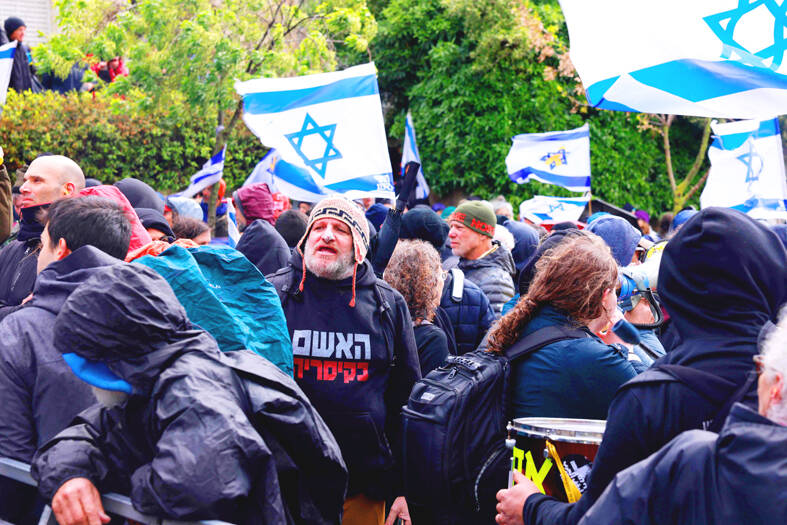Israel yesterday bombarded Gaza and pressed its ground operations after issuing what it called a “last warning” for the return of hostages and for Hamas to be removed from power.
Airstrikes began in Gaza early on Tuesday, killing more than 400 people, according to the Hamas-run territory’s health ministry.
Gaza rescuers said that at least 10 more people were killed in a pre-dawn bombing near Khan Yunis yesterday.

Photo: AFP
On Wednesday, the Israeli military announced it had resumed ground operations “in the central and southern Gaza Strip to expand the security perimeter and create a partial buffer between the north and south.”
“We’re digging with our bare hands,” said a man trying to dislodge a body from a heap of concrete in Gaza City.
After Israel urged civilians to leave areas it described as “combat zones,” people filled the roads leading out of northern Gaza.
Fred Oola, senior medical officer at the Red Cross field hospital in Rafah, said that the renewed strikes shattered the relative calm of the past two months.
“Now, we can feel the panic in the air ... and we can see the pain and devastation in the faces of those we are helping,” Oola added.
Addressing the “residents of Gaza” — governed by Hamas since 2007 — Israeli Minister of Defense Israel Katz said in a video: “This is the last warning.”
“Take the advice of the president of the United States. Return the hostages and remove Hamas, and other options will open up for you — including the possibility of leaving for other places in the world for those who want to,” Katz said, an apparent reference to a warning earlier this month by US President Donald Trump, who said: “To the People of Gaza: A beautiful Future awaits, but not if you hold Hostages. If you do, you are DEAD!”
Of the 251 hostages seized during Hamas’ Oct. 7, 2023, attack, 58 are still held by Gaza militants, including 34 the Israeli military says are dead.

Right-wing political scientist Laura Fernandez on Sunday won Costa Rica’s presidential election by a landslide, after promising to crack down on rising violence linked to the cocaine trade. Fernandez’s nearest rival, economist Alvaro Ramos, conceded defeat as results showed the ruling party far exceeding the threshold of 40 percent needed to avoid a runoff. With 94 percent of polling stations counted, the political heir of outgoing Costa Rican President Rodrigo Chaves had captured 48.3 percent of the vote compared with Ramos’ 33.4 percent, the Supreme Electoral Tribunal said. As soon as the first results were announced, members of Fernandez’s Sovereign People’s Party

MORE RESPONSIBILITY: Draftees would be expected to fight alongside professional soldiers, likely requiring the transformation of some training brigades into combat units The armed forces are to start incorporating new conscripts into combined arms brigades this year to enhance combat readiness, the Executive Yuan’s latest policy report said. The new policy would affect Taiwanese men entering the military for their compulsory service, which was extended to one year under reforms by then-president Tsai Ing-wen (蔡英文) in 2022. The conscripts would be trained to operate machine guns, uncrewed aerial vehicles, anti-tank guided missile launchers and Stinger air defense systems, the report said, adding that the basic training would be lengthened to eight weeks. After basic training, conscripts would be sorted into infantry battalions that would take

GROWING AMBITIONS: The scale and tempo of the operations show that the Strait has become the core theater for China to expand its security interests, the report said Chinese military aircraft incursions around Taiwan have surged nearly 15-fold over the past five years, according to a report released yesterday by the Democratic Progressive Party’s (DPP) Department of China Affairs. Sorties in the Taiwan Strait were previously irregular, totaling 380 in 2020, but have since evolved into routine operations, the report showed. “This demonstrates that the Taiwan Strait has become both the starting point and testing ground for Beijing’s expansionist ambitions,” it said. Driven by military expansionism, China is systematically pursuing actions aimed at altering the regional “status quo,” the department said, adding that Taiwan represents the most critical link in China’s

EMERGING FIELDS: The Chinese president said that the two countries would explore cooperation in green technology, the digital economy and artificial intelligence Chinese President Xi Jinping (習近平) yesterday called for an “equal and orderly multipolar world” in the face of “unilateral bullying,” in an apparent jab at the US. Xi was speaking during talks in Beijing with Uruguayan President Yamandu Orsi, the first South American leader to visit China since US special forces captured then-Venezuelan president Nicolas Maduro last month — an operation that Beijing condemned as a violation of sovereignty. Orsi follows a slew of leaders to have visited China seeking to boost ties with the world’s second-largest economy to hedge against US President Donald Trump’s increasingly unpredictable administration. “The international situation is fraught